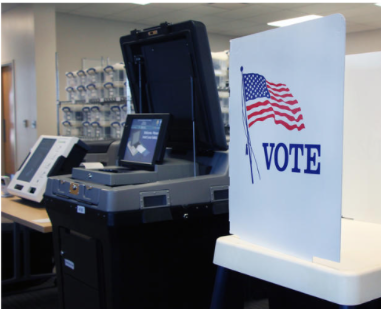TOPEKA, Kan. (AP) — Kansas’ attorney general contends that Secretary of State Kris Kobach shouldn’t be held personally liable for exposing sensitive personal information about hundreds of voters and that the voters have no constitutional right to their data being kept private.

KANSAS NEWS SERVICE
Attorney General Derek Schmidt’s office has in recent weeks filed documents outlining the state’s defense of Kobach in a lawsuit filed in June by the American Civil Liberties Union. The sensitive information exposed by Kobach’s office for 945 Kansas voters included partial Social Security numbers.
The ACLU’s lawsuit alleges “reckless maintenance” by Kobach of the Interstate Voter Registration Crosscheck Program, which compares voter registration lists among participating states to look for duplicates. The program, which Kobach administers, is aimed at cleaning voter records and preventing voter fraud but has drawn criticism for its high error rate and lax security.
Kobach, a conservative Republican, lost this year’s race for governor and served as vice chairman of President Donald Trump’s short-lived commission on voter fraud. He has called the lawsuit baseless.
Schmidt’s office argues that the U.S. Supreme Court “has never held that there is a constitutional right to prevent government disclosure of private information” and that Kobach is legally immune from a lawsuit. The ACLU is suing Kobach as an individual and in his official capacity as the state’s top elections official.
Lauren Bonds, the legal director for the ACLU of Kansas, said even if sensitive information isn’t constitutionally protected from disclosure, its release “was still reckless and extremely harmful to the voters who have had their information exposed.”
The lawsuit contends that it isn’t known how many voters had their information exposed, but that in a single communication in 2017, Florida election officials released the names, dates of birth, addresses and partial Social Security numbers of 945 Kansas voters in responding to an open records request.
Crosscheck compares registration lists and analyzes voters’ first names, surnames and dates of birth to determine whether a person is registered in multiple states. The lawsuit contends that most of the hits are false matches.
Kobach has encouraged states to provide voters’ partial Social Security numbers and other confidential information to narrow the list. The lawsuit alleges that Kobach regularly sent voter signatures as well as the Crosscheck computer server’s address and passwords by unencrypted email.
The program was started in 2005 and had only four participants when Kobach took office in 2011. By 2017, 30 states were participating and more than 100 million voter records were added to the database, according to the lawsuit.
Eight states — Florida, Alaska, Kentucky, Washington, Oregon, New York, Pennsylvania and Massachusetts — have left the program over security and data reliability concerns since Kobach began managing it.
___
